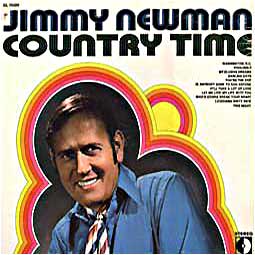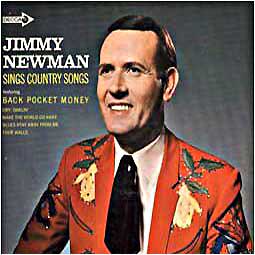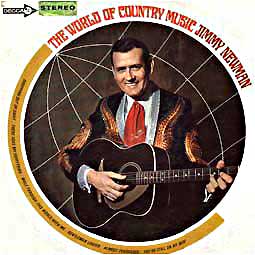


JIMMY C. NEWMAN
The "C" stands for
Cajun, he developed a fusion on several 1960s albums that established him as a
forerunner in Cajun-country music. Newman was born on August 27, 1927, in High
Point, LA. He recorded several unsuccessful sides in the late '40s for J.D.
Miller's Feature label, but Miller later convinced Nashville legend Fred Rose to
give the budding singer a shot. After recording four songs in 1953, Newman
signed to Dot Records and scored a hit the following year when "Cry, Cry,
Darling" reached number four in the country charts.
Newman's chart success prompted the Louisiana Hayride to hire him as a regular
performer. His next four hits all made Top Ten, including 1955's "Daydreamin',"
"Blue Darlin'," and "God Was So Good". Newman moved up to the Grand Ole Opry in
1956 and released "A Fallen Star" the following year. The single, his biggest
hit, spent two weeks at number two and also entered the pop Top 25.
By November of that year, Newman charted another Top Ten hit, "You're Makin' a
Fool Out of Me"; he closed out the decade with three Top 30 singles and the Top
Ten "Grin and Bear It" in July 1959. Newman began the '60s with success also,
bringing "A Lovely Work of Art" to number six and "Wanting You to Be With Me" to
number 11. Not content with his popularity at MGM, he switched labels, signing
with Decca in 1961.
Now that he was an established artist, Newman began to integrate Cajun
influences in such Top 25 singles as "Alligator Man" and "Bayou Talk." His 1963
album Folk Songs of the Bayou Country was a milestone in the popularization of
Cajun music and included great work by accordionist Shorty LeBlanc and Newman
regular Rufus Thibodeaux on fiddle. He hit the country Top Ten at the end of the
year with "D.J. for a Day," and his recordings soon moved back to the Nashville
sound, with occasional Cajun influences. (One notable exception is 1967's
Louisiana Saturday Night.)
Newman reached the Top Ten twice within six months in 1965-1966 with "Artificial
Rose" and "Back Pocket Money," but they proved to be his final hits. The
following three years saw occasional placements in the Top 30, and his last
chart entry was 1970's "I'm Holding Your Memory (But He's Holding You)".


